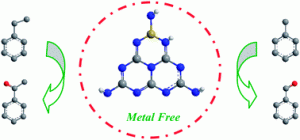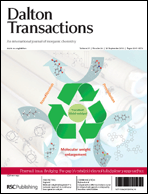Metal-free polymers have the potential to replace toxic metal catalysts in hydrocarbon oxidation reactions, according to an international team of chemists in the RSC journal Chemical Science.
Yong Wang, at the Max-Planck Institute of Colloids and Interfaces, Potsdam, Germany, and colleagues replaced some of the carbon atoms in graphitic carbon nitride with boron. The resulting polymeric material was better than previous biomimetic homogeneous oxidation catalysts at oxidising substituted aromatics.
Oxidations of sp3 hybridised C-H bonds are challenging because the oxidised products are more reactive than the starting materials and so they tend to over-oxidise. This was not a problem for Wang’s catalyst, which was highly selective at forming ketones or aldehydes.

Synthesis of boron doped polymeric carbon nitride solids and their use as metal-free catalysts for aliphatic C–H bond oxidation
Yong Wang, Haoran Li, Jia Yao, Xinchen Wang and Markus Antonietti
Chem. Sci., 2011, Advance Article
DOI: 10.1039/C0SC00475H , Edge Article
Submit your latest catalysis research to Catalysis Science and Technology!
 You can find out what is going on in Catalysis Science & Technology in new ways now we have joined Facebook and Twitter.
You can find out what is going on in Catalysis Science & Technology in new ways now we have joined Facebook and Twitter.











 eresting collection of articles is ‘dedicated to molecular approaches in catalysis dealing with the preparation, characterization, modeling, and reactivity of catalysts whether homogeneous, heterogeneous or biocatalysts’ and includes contributions from the guest editors Christophe Coperet and Rutger van Santen, as well as a range of scientists such as Timo Jacob, Dieter Vogt, Xiaodong Zou and Johannes G. de Vries.
eresting collection of articles is ‘dedicated to molecular approaches in catalysis dealing with the preparation, characterization, modeling, and reactivity of catalysts whether homogeneous, heterogeneous or biocatalysts’ and includes contributions from the guest editors Christophe Coperet and Rutger van Santen, as well as a range of scientists such as Timo Jacob, Dieter Vogt, Xiaodong Zou and Johannes G. de Vries.
